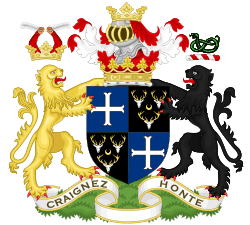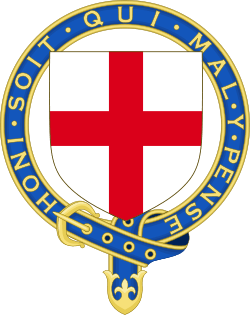William Cavendish-Bentinck, 6th Duke of Portland
| His Grace The Duke of Portland KG GCVO TD PC DL | |
|---|---|
|
The Duke of Portland, circa 1900. | |
| Master of the Horse | |
|
In office 9 August 1886 – 11 August 1892 | |
| Monarch | Queen Victoria |
| Prime Minister | The Marquess of Salisbury |
| Preceded by | The Earl of Cork |
| Succeeded by | The Viscount Oxenbridge |
|
In office 16 July 1895 – 4 December 1905 | |
| Monarch |
Queen Victoria Edward VII |
| Prime Minister |
The Marquess of Salisbury Arthur Balfour |
| Preceded by | The Earl of Cork |
| Succeeded by | The Earl of Sefton |
| Personal details | |
| Born | 28 December 1857 |
| Died | 26 April 1943 (aged 85) |
| Nationality | British |
| Political party | Conservative |
| Spouse(s) |
Winifred Dallas-Yorke (1863–1954) |
William John Arthur Charles James Cavendish-Bentinck, 6th Duke of Portland KG GCVO TD PC DL (28 December 1857 – 26 April 1943), known as William Cavendish-Bentinck until 1879, was a British landowner, courtier and Conservative politician. He notably served as Master of the Horse between 1886 and 1892 and again between 1895 and 1905.
Background and education
Portland was the son of Lieutenant-General Arthur Cavendish-Bentinck by his first wife Elizabeth Sophia Hawkins-Whitshed, daughter of Sir St Vincent Hawkins-Whitshed, 2nd Baronet and granddaughter of Admiral Sir James Hawkins-Whitshed, 1st Baronet. His paternal grandparents were Lord Charles Bentinck and his second wife Anne Wellesley, the natural daughter of Richard Wellesley, 1st Marquess Wellesley. His great-great-uncle was Arthur Wellesley, 1st Duke of Wellington. Lord Charles was the third son of Prime Minister William Cavendish-Bentinck, 3rd Duke of Portland by his wife Lady Dorothy Cavendish, daughter of William Cavendish, 4th Duke of Devonshire and Lady Charlotte Boyle. Portland's mother died only a few days after his birth. He was educated at Eton.[1] He inherited the Cavendish-Bentinck estates, based around Welbeck Abbey in Nottinghamshire, from his cousin William Cavendish-Scott-Bentinck, 5th Duke of Portland, in 1879. He also succeeded his stepmother as second Baron Bolsover in 1893. His half-sister Lady Ottoline Morrell was a society hostess and patron of the arts associated with the Bloomsbury Group.
Public life
Portland initially embarked on a military career and served as a lieutenant in the Coldstream Guards.[2] from 1877 to 1880, and as lieutenant-colonel of the Honourable Artillery Company from 1881 to 1889.[3] He was honorary colonel of the 1st Lanarkshire Artillery Volunteers from 1884 to 1891,[4] and of the 4th Battalion of The Sherwood Foresters from 1889,[3] and of the latter regiment's 7th Battalion (Territorial Army) from 1898.[4]
He sat on the Conservative benches in the House of Lords and held office as Master of the Horse under Lord Salisbury from 1886[5] to 1892[1] and from 1895[6] to 1902 and under Arthur Balfour from 1902 to 1905.[1] In 1886 he was sworn of the Privy Council.[7]
He was made a Knight Grand Cross of the Royal Victorian Order (GCVO) in 1896[8] and a Knight of the Garter in 1900.[9] and holder of the Royal Victorian Chain.[3] He was appointed a Knight of Justice of the Order of the Hospital of St. John of Jerusalem in England (KStJ) in July 1901.[10] He also held the Grand Cross of the Order of Charles III (Spain), 1st Class Order of St Sava (Serbia) the Grand Cordon of the Order of the Crown (Belgium),[3] and the Grand Cross of the Order of St Stephen (Austria-Hungary).[4]
He was Lord-Lieutenant of Caithness from 1889 to 1919, Lord Lieutenant of Nottinghamshire from 1898 to 1939, a Deputy Lieutenant of Ayrshire, and a trustee of the British Museum.
The Portlands received Archduke Franz Ferdinand of Austria at Welbeck Abbey for a week in 1913 when the heir to the Austro-Hungarian throne visited England. During the stay he took the Archduke shooting on the estate when, according to Portland's memoirs, Men, Women and Things:
"One of the loaders fell down. This caused both barrels of the gun he was carrying to be discharged, the shot passing within a few feet of the archduke and myself. I have often wondered whether the Great War might not have been averted, or at least postponed, had the archduke met his death there and not at Sarajevo the following year."[11]
From 1937 to 1943 he was Chancellor of the Order of the Garter.[1] At the coronation of King George VI Portland carried the crown of Queen Elizabeth, whose mother (the Countess of Strathmore and Kinghorne) was his cousin. It was at his estate in Langwell that the Sunderland Flying boat carrying the Duke of Kent (the King's youngest brother) crashed while en route to a RAF Base in Iceland.
Thoroughbred horse racing
Portland inherited the estate and stud farm near Clumber Park in North Nottinghamshire. Among the horses he owned was St. Simon, who won the 1884 Ascot Gold Cup. He also bred and owned Ayrshire and Donovan, who won the 1888 and 1889 runnings of the Epsom Derby.
Family

Portland married Winifred Anna Dallas-Yorke, daughter of Thomas Dallas-Yorke, on 11 June 1889. They had three children:[12]
- Lady Victoria Alexandrina Violet Cavendish-Bentinck (born 27 February 1890, died 8 May 1994), married Captain Michael Erskine-Wemyss and had issue. She was the last surviving godchild of Queen Victoria.[13]
- William Arthur Henry Cavendish-Bentinck, 7th Duke of Portland (born 16 March 1893, died 21 March 1977)
- Lord (Francis) Morven Dallas Cavendish-Bentinck (born 27 July 1900, died 22 August 1950), died unmarried.
Portland died in April 1943, aged 85, and was interred at the traditional burial place of the Dukes of Portland in the churchyard of St Winifred's Church at Holbeck. He was succeeded by his eldest son, William. The Duchess of Portland died in July 1954, aged 90.[1] The department of Manuscripts and Special Collections, The University of Nottingham holds estate papers of the 6th Duke in the Portland (London) Collection (Pl).[2]
Ancestry
Arms
 |
|
Publications
Portland was author of the following memoirs:
- Fifty Years and More of Sport in Scotland (1933)[14]
- Memories of Racing and Hunting (1935)[14]
- Men, Women and Things (1937)[14]
References
- 1 2 3 4 5 thepeerage.com William John Arthur Charles James Cavendish-Bentinck, 6th Duke of Portland
- 1 2 Biography of the 6th Duke, with links to online catalogues, from Manuscripts and Special Collections, The University of Nottingham
- 1 2 3 4 Burke's Peerage, Baronetage and Knightage, Volume II, 106th Edition. Burke's Peerage (Genealogical Books) Ltd. 1999. p. 2287. ISBN 2-940085-02-1.
- 1 2 3 Kelly's Handbook to the Titled, Landed and Official Classes, 1918. Kelly's. p. 1250.
- ↑ The London Gazette: no. 25615. p. 3854. 10 August 1886.
- ↑ The London Gazette: no. 26645. p. 4101. 19 July 1895.
- ↑ The London Gazette: no. 25617. p. 4005. 17 August 1886.
- ↑ The London Gazette: no. 26743. p. 3123. 26 May 1896.
- ↑ The London Gazette: no. 27175. p. 1875. 20 March 1900.
- ↑ The London Gazette: no. 27330. p. 4469. 5 July 1901.
- ↑ BBC Radio Nottinghamshire article.
- ↑ The Peerage, entry for 6th Duke of Portland
- ↑ Massingberd, Hugh, ed. (1995) The Daily Telegraph Book of Obituaries. Macmillan; p. 324
- 1 2 3 Who Was Who, 1941-1950. A and C Black. 1952. p. 928.
External links
| Wikimedia Commons has media related to William Cavendish-Bentinck, 6th Duke of Portland. |
| Political offices | ||
|---|---|---|
| Preceded by The Earl of Cork |
Master of the Horse 1886–1892 |
Succeeded by The Viscount Oxenbridge |
| Master of the Horse 1895–1905 |
Succeeded by The Earl of Sefton | |
| Honorary titles | ||
| Preceded by The Earl of Caithness |
Lord Lieutenant of Caithness 1889–1919 |
Succeeded by Sir Archibald Sinclair, Bt |
| Preceded by The Duke of St Albans |
Lord Lieutenant of Nottinghamshire 1898–1939 |
Succeeded by Marquess of Titchfield |
| Preceded by The Bishop of Oxford |
Chancellor of the Order of the Garter 1937–1943 |
Succeeded by The Viscount Halifax |
| Preceded by The Duke of Connaught and Strathearn |
Senior Privy Counsellor 1942–1943 |
Succeeded by The Marquess of Crewe |
| Peerage of Great Britain | ||
| Preceded by William Cavendish-Scott-Bentinck |
Duke of Portland 1879–1943 |
Succeeded by William Cavendish-Bentinck |
| Peerage of the United Kingdom | ||
| Preceded by Augusta Cavendish-Bentinck |
Baron Bolsover 1893–1943 |
Succeeded by William Cavendish-Bentinck |

